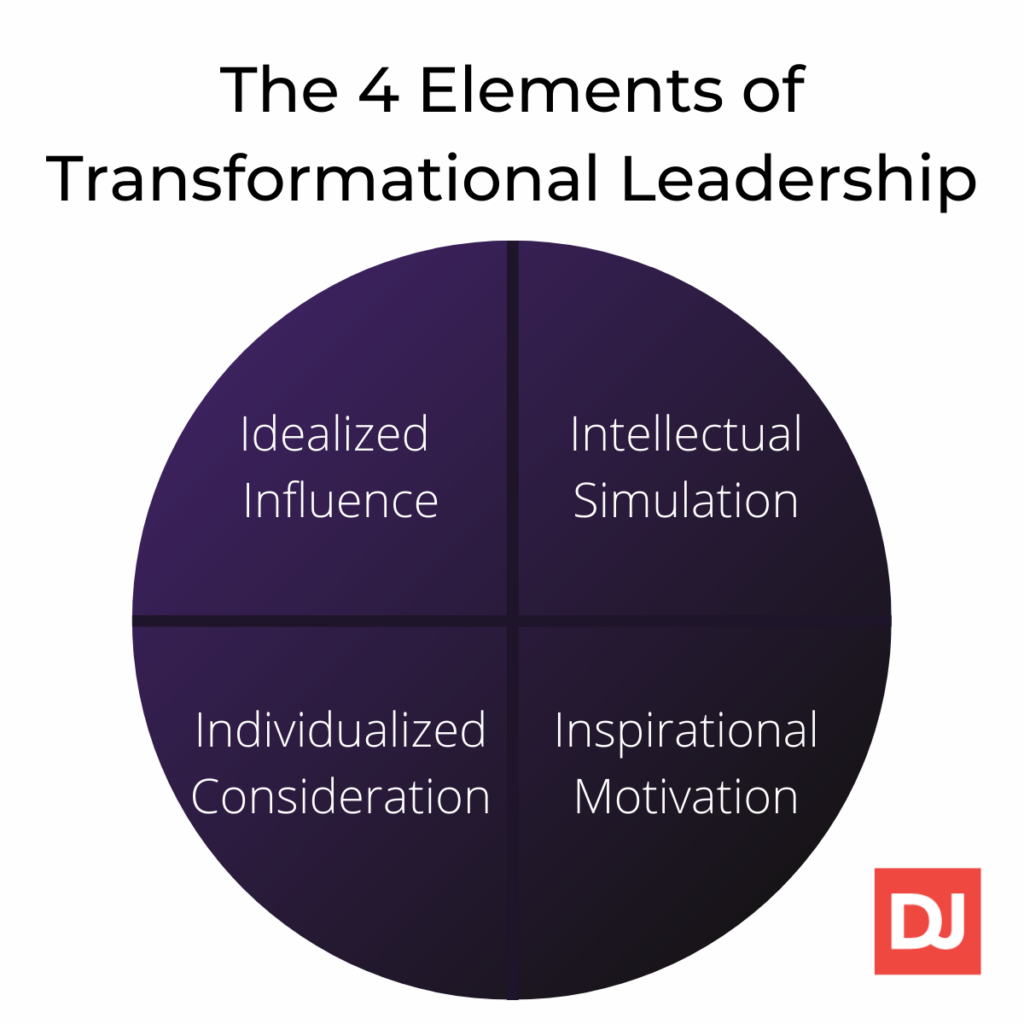In the world of remote work, where nuances matter and the challenges are as real as they come, there’s one leadership style that’s been making waves: transformational leadership. Over the years, as the remote work landscape has rapidly evolved, some leadership styles have naturally risen to the challenge. Transformational leadership isn’t just another buzzword; it’s the real deal.
Having seen and experienced the ins and outs of remote work firsthand, I can attest to the undeniable impact of transformational leaders. They don’t merely adapt to the remote environment; they thrive, setting standards and steering their teams with confidence and vision. If you’re keen to explore the essence of leadership that really makes a difference in remote organizations, then you’re in for an enlightening journey into the world of transformational leadership.
What is Transformational Leadership in Businesses?
At its core, transformational leadership isn’t just about taking charge or making decisions. Oh no, it’s far more profound than that. It’s about inspiring and motivating your team, about painting a vision so compelling that everyone feels drawn to it. It’s about recognizing potential, fostering growth, and most importantly, creating a culture where everyone feels they’re a part of something bigger.
Having navigated the diverse terrains of business, I’ve seen firsthand how transformational leaders don’t just manage; they elevate. They challenge the status quo, spark innovation, and bring out the best in their teams.
In this type of leadership, employees are encouraged to think outside the box and be creative when it comes to finding new approaches to problems.
Let’s take a close look at the transformational leaders’ characteristics:
1. Self-management
Transformational leaders manage themselves well and don’t need to be directed by others. They are always motivated and use this motivation to guide their team and encourage each member. This type of leader believes in what they do and share that belief to their employees.
2. Extremely good communicators
Transformational leaders know how to talk and convince people because they genuinely believe in what they do. They communicate clearly and with all honesty. They are also great listeners and want each member of the team to feel listened to.
3. Have a strong vision
This type of leader knows the direction their team is heading. They might not know how to get there, but they know where they want to go and why. This vision and their communication abilities make them have loyal and committed employees who want to work for the common goal.
4. Inspire
One of the most noticeable characteristics of transformational leaders is that they are truly inspiring. They know that each member of the team matters and makes each one of them feel that way. They continuously remember their colleagues why their work is important and why each one of them is a crucial piece to get to the final goal.
5. Make difficult decisions
Transformational leaders are very conscious of what they decide. They take risks and are bold but think everything through. Yet they are never shy about having to make hard decisions.
6. Empower employees
These leaders provide constant coaching and mentoring to their employees, but they also allow them to make decisions and take important tasks. They encourage employees to inspire others, as well.
Transformational leadership seems like a story from a fairytale. There are too many good things that come when leaders inspire their employees. But are there any drawbacks of implementing this type of leadership?
Transformational Leadership Pros and Cons
| Pros | Cons |
| Honest and ethical companies | Too much focus on the bigger picture makes leaders forget small and important details |
| Employees feel constantly motivated, and therefore, are more productive | Leaders can use this leadership style to manipulate |
| Engaged employees | Can lead to employee burnout |
| Teams are more collaborative and united because they share one common goal | Requires constant feedback sessions and meetings |
| Teams communicate better | It might make employees feel under a lot of pressure |
| Encourages change | It doesn’t have a universal application (Doesn’t work on mechanized organizations) |
What are the Four Elements of Transformational Leadership?
The Transformational Leadership concept was first described by James MacGregor Burns, in his book Leadership. It was later expanded in the 1980s by Bernard M. Bass. In Bass’ interpretation, he identified four crucial elements all transformational leaders should have.

1. Idealized Influence (II)
This element emphasizes on how transformational leaders use their style and charisma to influence their teams. They provide a clear vision and encourage employees to work hard and collaboratively. Also, this leadership style is characterized by leaders willing to take risks and follow a core set of values.
2. Intellectual Simulation (IS)
Creativity and autonomy are highly encouraged by transformational leaders. One of the objectives these leaders have is to inspire their team members to come up with different ideas and ways to face problems and obstacles. They encourage them to speak out without criticizing them, making employees more motivated to participate and get involved.
3. Individualized Consideration (IC)
Transformational leaders seek to have a supportive environment where all individuals are equally respected. They want to support each member of the team, and they do that by listening to their concerns and acting as coaches. They want every member to be their best version.
4. Inspirational Motivation (IM)
This element refers to the ability transformational leaders have when it comes to inspiring confidence and motivation in their teams. Leaders should explain and believe in their vision, communicating it efficiently to all their employees.
Transformational Leadership in a Virtual Environment
There are so many myths regarding management styles in remote environments. There is still the assumption that remote workers are lazy, don’t work enough, and feel lonely all the time. If you manage a team of lazy loners, we’re sorry to break it to you, but the problem is in how you are leading your team.
What is remote transformational leadership?
One of the main challenges that remote transformational leaders have is regarding their communication abilities. They have to know how to implement the right communication channels and tools on their teams. Besides, they have to decipher how to motivate each member of the group without having them in an office.
How can they do this? Here are some tips for those wanting to implement remote leadership in their management style:
- Having clear communication guidelines
- Establish clear objectives and goals
- Constantly motivate their teams
- Connect with employees (By video calls)
- Worry about all members of the team
- Foster participation, and encourage employees to speak up on remote meetings
- Virtual water coolers
Transformational leadership in remote teams works efficiently if implemented well. Remote leaders make sure their employees are emotionally well and encourage them with tools and advice to boost productivity to higher levels. The outcome? Highly productive and motivated remote teams. But why is remote transformational leadership effective?
Studies of Remote Transformational Leadership
The following studies were published in the Leadership and Organization Development Journal in 2003. This research objective was to determine if remote transformational leadership is as effective as it is on an onsite working environment.
First Study
During the first study, a total of 132 students from one Canadian university participated voluntarily in the main experiments. None of the students had received any type of formation regarding types of leadership. The experiment consisted of participants reading a hypothetical situation (in the form of vignette) containing the e-mail from an employee and their employer. There were three different types of vignettes that simulated three different leadership styles: 1) Transformational Leadership. 2) Management by exception. 3) Laissez-faire.
The study aimed to determine if recipients (students) could identify leadership messages when presented in the emails.
The results? Students were able to identify different leadership styles. The emails containing transformational leadership messages were strongly associated with greater interpersonal justice and satisfaction than the other two leadership styles.
Second Study
This second study’s main objective was to examine the effects of remote transformational leadership on motivation and performance using a laboratory-based investigation. Two main characteristics of transformational leadership were studies: Charisma and Intellectual stimulation.
105 undergraduate psychology students at a Canadian university participated. The experiment involved the use of a group problem-solving task. The first task required participants to read a short scenario describing a survival situation in which they were stuck on a mountain with limited supplies during a winter storm. The task was to order a list of supplies to survive (from the most important to the least important). Once participants completed the rankings individually, they had to gather on a team and derived a consensus ranking.
Before starting the tasks, participants were given a copy of an email containing either a charismatic, intellectually stimulating, neutral, or both types of messages.
The Results? Participants who read the intellectually stimulating email rated their leader as more intellectually stimulating, the same happened with charismatic leaders and overall transformational leaders (both characteristics were recognized). All participants who received these types of email (transformational leadership, charismatic, or intellectually stimulating) performed better. The same happened with group performance.
Both studies proved that the same effects happened when transformational leaders act in a virtual environment than on a site environment. Individuals can detect and respond through different types of leadership expressed in various types of communications.
Leaders Without the Right Team?
You can be the greatest transformational leader (or any other kind of leader), but your efforts will be all in vain without the right team. Not everyone likes working remotely, and hiring unmotivated employees can be one of the worst mistakes managers make. If you want to lead a team to success, you need the right people with you. Take our word for it, we have been helping companies hire the best remote developers for almost a decade, and they know it’s worth it. If you need any tech magician on your team: 1) Think remote, and 2) Contact us! We can headhunt the talent you need in less than two weeks.





